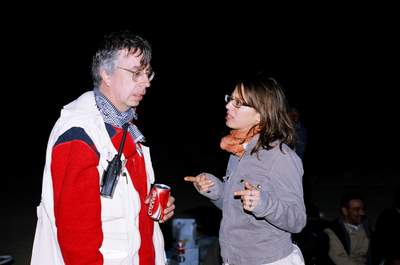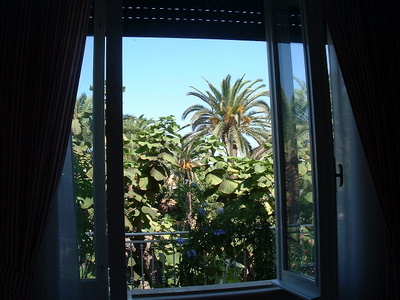
When I was seventeen, as part of the tests to graduate secondary school, we had to read three books from one author, and make short summary. I choose
Louis-Paul ("Lowie") Boon, a Flemish writer, columnist, socialist and anarchist. He was not really educated. He was a house painter. But he was a born artist and story teller.
He lived in poverty while he wrote his first book. After 400 pages of it, he discarded the relevance, and hung it from a string on his bathroom wall, so he could save on toilet paper. His wife took the manuscript, read it, took the last page and wrote on it: "Etcetera, Etcetera, Etcetera". She wrapped everything together in brown paper and sent it off to a publisher. It won the Leo J. Krijn Prize for literature.
I did not read three books from Louis-Paul Boon. I got fascinated by him and read all of his books, about 30 or 40 by then. Some of the books had the size of an encyclopedia. And I did not write a summary, I wrote a 100 page thesis. My teachers collectively declared me a nut case and I graduated (almost failing my maths exam, though, but that is a different story).
No surprise Louis-Paul Boon left a lasting impression on the teenager I was, and still am. Not only in his writing style and approach to life, but also in some of his basic principles. One of them was "You have to kick people until they have a conscience": You have to repeat ethical values to people, slam their face with it, until they understand. Head-on. That sentence remained within me, lingering.
Being young, you want to prove yourself, so I got into the commercial world, into the business. And not just any business. After some adventures at a hitech research company, I joined a company -at that time- at the heart of the world's financial world. I worked at their headquarters, in a building designed by Ricardo Bofill and set on an old castle estate near Brussels.

If you thought banks were the summon of "prestige", think again. This was a step beyond that... Everything, even the cafeteria furniture was custom designed. You can imagine what was at the center of the business. Money.

Gradually, Louis-Paul Boon started to creep back into my mind. My commercial instincts got into a battle with my ethic values, which had remained dormant during the first years in my career. Then came the evening that changed the rest of my life. I could no longer work for a commercial company. The lust for life, for adventure, for the horizon, but mainly the drive to 'make a positive change in this world', got stronger.
My conscience won the battle. I gave up my management career, went to the Antarctic, wrote a book, and started my professional life from scratch as a technician for the Red Cross.
Gradually, once more, my commercial and competitive instincts got the upper hand. While I continued to work in the humanitarian world, I gradually got sucked into the hard core "business" aspect of it: concentrating on my core work, I would do the stuff I did well, and do it head-on. I would not always put it all in a humanitarian context.
As the years went on, my team grew. I hired hundreds of people over the years. Many left a trace in my mind and heart. It was not until the midst of the 2003 Iraq crisis, we hired Larisa.
Larisa started the Pink Revolution in our team. She would question all and everything. She was a pain. She would be the one saying "you can not kill to feed the hungry". Not meant literally (thank God!), but rather: "you can not run over your ethics while doing your humanitarian work".
She triggered my conscience back into a ferocious battle with my competitive instincts. And this time, the conscience would get the upper hand. It has ever since, I'd love to believe.
My conscience is a big as a 30 story flat now. It dominates everything I do. Every time I raise my voice (a lot), piss off people (a lot), hurt someone (luckily rarely I would think), I can not sleep at night. I am trying to lead a life where my ethics determine what and how I do it. It dominates.
That makes me a pain to work with. That makes it impossible to manage me. Many see me as a loose canon. I simply can not keep quiet. I feel guilty if I have something on my mind, and do not speak up, or question. I fight battles, often loosing battles. I bang my head against the wall continuously. But I do not give up. This blog, The Road, is part of that dynamic, by the way.
The "conscience" is one of the reasons I continue to work in the humanitarian world. Not only because it is "humanitarian", but maybe, maybe, I can work on "change from within". The UN is criticised a lot. But it is easy doing that from the sidelines. I want to do it while being in the midst of it. Trying to make a change from within.
And maybe, maybe, I can instill a change in people. Even if it was in a small part, I want to change the world. And remind people of their conscience. Every day is a battle to continue doing that. It is so easy to get sucked into your daily job, without loosing sight of the wider, the humanitarian, the human context.
Every day, I have to remind myself. Every day, I have to weigh the conscience part, with the work I have to deliver. Not loosing sight of either. Every day. Every day, I want to kick people until they have a conscience. "Lowie" in me has not died. Is he still alive within you?
Pictures courtesy Ricardo Bofill, Klara
Read the full post...













 In principle, this could be the shortest blogpost I ever wrote:
In principle, this could be the shortest blogpost I ever wrote: 

















 Emily Troutman is a writer and photographer living in Washington. She just came back after a month travelling around Kivu, in the East of
Emily Troutman is a writer and photographer living in Washington. She just came back after a month travelling around Kivu, in the East of 

 Peter. Flemish, European, aid worker, expeditioner, sailor, traveller, husband, father, friend, nutcase. Not necessarily in that order.
Peter. Flemish, European, aid worker, expeditioner, sailor, traveller, husband, father, friend, nutcase. Not necessarily in that order.
The Road's Dashboard
Log in
New
Edit
Customize
Dashboard